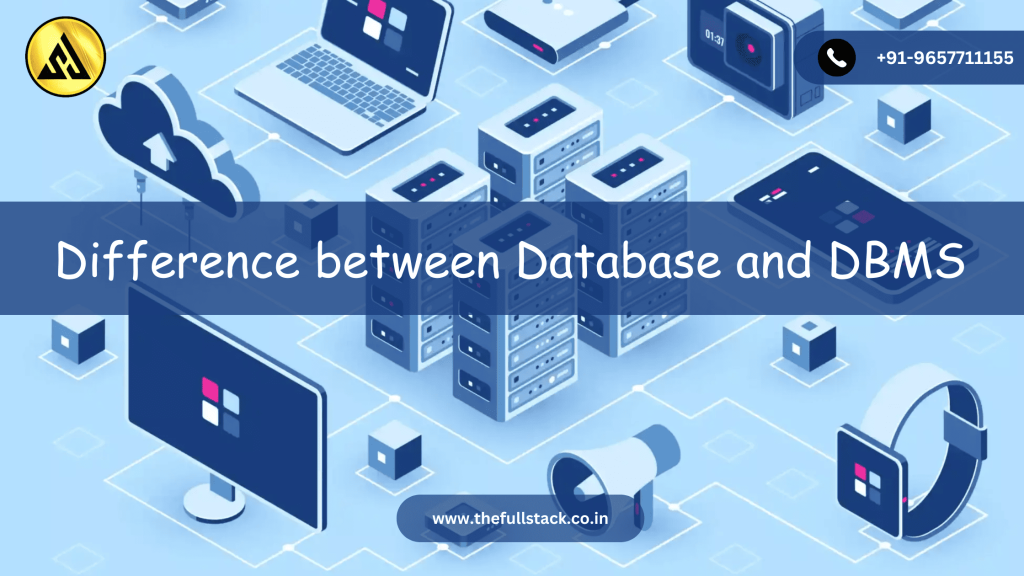Databases are collections of connected data that are used to address an organization’s data management requirements. On the other hand, database management systems (DBMS) are extremely sophisticated pieces of software that control databases and store data on secondary storage media.
What is a database?
A database is a systematic grouping of structured data or information that is usually kept electronically in a computer system. Databases are used to effectively store, manage, and retrieve data. The information in a database is arranged to facilitate easy access, management, and updating.
Features of an Information System
- Data structure: Information is arranged into fields, tables, and records.
- Consistency: preserves the consistency and integrity of the data
- Scalability: the ability to grow to accommodate high data volumes.
- Security: To avoid unwanted access, data is frequently stored securely.
Benefits of a Database
- Effective Data Management: Databases make it possible to store and retrieve data in an effective manner.
- Ensuring the accuracy and consistency of data is known as data integrity.
- Data security: Offers defenses against unwanted access to the data.
- Scalability: The ability to manage massive data volumes as the company expands.
Disadvantages of a Database
- Complexity: Designing and maintaining a database can be complex and require specialized knowledge.
- Cost: High-performance databases and their maintenance can be costly.
- Performance: Large databases can suffer from performance issues if not properly optimized.
What is DBMS?
To collect and analyze data, a database management system (DBMS) is a software program that communicates with the user, other programs, and the database itself. Users can add, read, edit, and remove data from a database using a database management system (DBMS). It offers an interface between the people or apps that are querying the data and the data that is stored in the database.
Types and Functions:
- The establishment and alteration of the database structure are made possible by data definition.
- Data Manipulation: Facilitates data retrieval, insertion, deletion, and alteration.
- Data integrity and security: guarantees that data is reliable, safe, and consistent.
- Data Access Control: Regulates who has the ability to see and alter data.
- Backup and Recovery: Offers strategies for data backup and recovery in the event of an outage.
Advantages of DBMS
- Data Abstraction: conceals from users the intricacies of data storage.
- Effective data handling: Effectively handles vast volumes of data.
- Multiple users can access data simultaneously thanks to concurrent access.
- Data security and integrity make guarantee that only people with permission can access and change data.
Drawbacks of DBMS
- Complexity: Setting up a database management system (DBMS) can be difficult and time-consuming.
- Cost: A DBMS’s licensing, upkeep, and operation can be costly.
- Performance Overhead: Occasionally, the extra features and abstraction can result in performance overhead.
Difference between Database and DBMS:
| Category | Database | DBMS |
|---|---|---|
| Definition | A database is a collection of connected information about people, locations, or things | A database management system (DBMS) is a collection of programs that allow you to create, manage, and operate a database. |
| Storage | Besides computers, databases can even be maintained in physical ledgers, books, or papers. | In a database management system (DBMS), all the records are maintained only on a computer. |
| Data Retrieval | The retrieval of information from the databases can be done manually, through queries, or by using programs (C, C++, Java, etc.). | We can retrieve the data from the database management system through queries written in SQL. |
| Speed | As databases can be handled manually or via computers, when SQL is not used to retrieve information, it can be very slow. | As a computer system is involved in a database management system, the retrieval of information is very quick. |
| Access | The databases are not designed for a large number of people who can access data at the same time, rather it is designed for a very small number of people (preferably few people) who access data at different times. | The database management system is designed for a large number of people who can access the data at the same time. |
| Data | Data is stored in databases. | A database management system (DBMS) manages and manipulates data. |
| Data Manipulation | In the case of the databases, very less information can be modified at a time. | In the database management system (DBMS), a lot of information can be changed at one time (as it can have many users using it at the same time) |
| Backup and Recovery | The databases do not ensure that the data will be available after failure arises. | The database management system (DBMS) ensures that the data will always be available even after system failures. |
Conclusion
All things considered, a database management system (DBMS) is the instrument that handles and communicates with the data, whereas a database is just a collection of ordered data. For effective data management, it is essential to comprehend how these two ideas differ from one another. Although the data is stored in a database, a database management system (DBMS) provides a number of functionalities to work with the data, guaranteeing its efficiency, security, and integrity.
It might ne helpful:
Introduction to Serverless Databases: Firebase, AWS DynamoDB, & More

